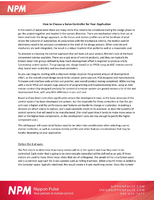Centillium Leads the Way to Greener Broadband with Initiative for Environmentally Friendly, Low-Power Communications Chipsets
Share:
FREMONT, Calif., Nov. 27 -- Centillium Communications, Inc. (NASDAQ:CTLM), today announced an initiative to facilitate greener broadband by developing its next-generation communications systems-on-chip (SoC) with smaller form factors and significantly reduced power consumption. Centillium has consistently maintained a leadership position in developing chipsets that require less power than competitive solutions, offering telecommunications providers significant advantages in system performance and energy costs across VoIP, DSL and FTTP network deployments. The new initiative seizes the unique opportunity to extend the customer benefits of low-power designs while mitigating the environmental impacts of broadband networks, and formalizes Centillium's commitment to significant power reductions across the next generation of its SoC products.
"Broadband lines are always on, constantly drawing power and consuming energy in ways that traditional telephony has not," said Faraj Aalaei, CEO, Centillium Communications. "It makes good sense, both from an economic and environmental standpoint, to design chips that will consume less power. In fact, while our telco customers have always valued the power savings our SoCs offer on the basis of cost savings and performance advantages, for the first time we are hearing from them an increased concern about environmental impacts of their broadband deployments. With our new product development initiative, Centillium is committed to designing our next generation of chipsets with a smaller environmental footprint and a substantial power advantage over our current generation."
The global market for broadband continues to grow rapidly. In the 12 months from May 2006 to May 2007, approximately 65 million new broadband subscribers signed up for high-speed access to the Internet, reports In-Stat (http://www.in-stat.com/); by 2011, total worldwide broadband subscribers are expected to number 567 million, almost double the current 285 million subscriber base, according to the market research firm. This ongoing expansion, along with ever-increasing data rates and growth in services, continues to push broadband power consumption higher. With every broadband line representing an always-on consumer of energy resources, lower-power chipsets can provide significant power savings for each line, with gains extended exponentially across large-scale deployments to create a substantial savings of energy. Estimated worldwide broadband power consumption today equals roughly 5TW-Hrs (terawatt-hours) annually; by 2011, worldwide broadband power consumption is estimated to be roughly 10TW-Hrs annually. A 25% reduction in power consumption could save the energy equivalent of 110GW-Hrs (gigawatt-hours) annually by 2011.
Centillium's green technology initiative signals an era in which the constant advance in the power and scale of telecommunications networks coincides with a heightened commitment to environmental concerns. Centillium's customers, telecommunications providers with VoIP, DSL and FTTP network deployments, need high-performance, tightly integrated infrastructure chipsets delivering high port-density and low power-consumption. High port density allows service providers to serve more customers with fewer pieces of equipment, while a low power chipset leads to lower energy and operational costs for the service provider, as well as lower power consumption for consumer products.
Centillium's next generation of low-power DSL, VoIP and Optical chipsets, in design now for release throughout 2008, will benefit from a much steeper power reduction strategy due to optimizations in SoC architecture, signal processing algorithms, processor architectures and lower power processes. As part of the initiative, Centillium will migrate its chip production to highly power-efficient and aggressive process technologies.
In compliance with the European Commission's and other international efforts addressing RoHS Directive 2002/95/EC (Restriction of Hazardous Substances), Centillium Communications offers a RoHS compliant package/product offering that meets the highest industry standard (JEDEC) reliability requirements. Centillium is committed to environmental efforts and all manufacturing is compliant with ISO Environmental Management Systems.
About Centillium Communications
Centillium Communications, Inc. is a leading innovator of high performance, cost-effective semiconductor solutions that give consumers, enterprises and service providers the winning edge in broadband access. The company's complete, end-to-end system-on-chip solutions accelerate development time-to-market for "last mile" products with Digital Subscriber Line (DSL), Fiber-To-The-Premises (FTTP) and Voice-over-Internet Protocol (VoIP) technologies. Centillium products include digital and mixed-signal integrated circuits and related software for DSL and FTTP central office and customer premises equipment and VoIP solutions for carrier- and enterprise-class gateways and consumer telephony. Centillium is a global company with headquarters in Fremont, CA. Additional information is available at http://www.centillium.com/.
Source: Centillium Communications, Inc.
CONTACT:
Vivian Chen
of Centillium Communications,
+1-510-771-3628,
vchen@centillium.com; or
James McIntyre
of McClenahan Bruer Communications,
+1-503-546-1000,
james@mcbru.com,
for Centillium Communications, Inc.




